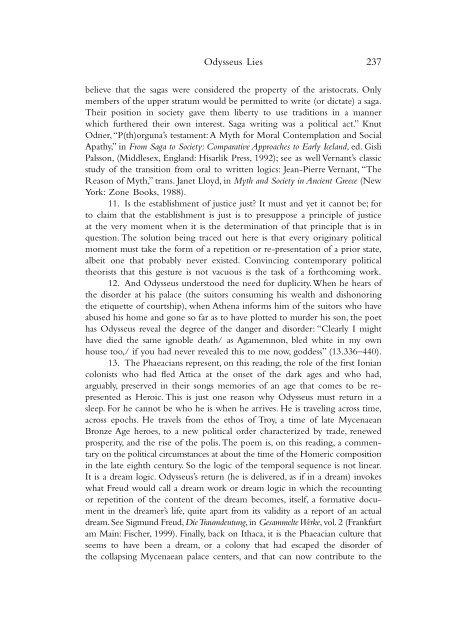You also want an ePaper? Increase the reach of your titles
YUMPU automatically turns print PDFs into web optimized ePapers that Google loves.
Odysseus Lies<br />
237<br />
believe that <strong>the</strong> sagas were considered <strong>the</strong> property <strong>of</strong> <strong>the</strong> aristocrats. Only<br />
members <strong>of</strong> <strong>the</strong> upper stratum would be permitted to write (or dictate) a saga.<br />
Their position in society gave <strong>the</strong>m liberty to use traditions in a manner<br />
which fur<strong>the</strong>red <strong>the</strong>ir own interest. Saga writing was a political act.” Knut<br />
Odner, “P(th)orguna’s testament: A Myth for Moral Contemplation and Social<br />
Apathy,” in From Saga to Society: Comparative Approaches to Early Iceland, ed. Gisli<br />
Palsson, (Middlesex, England: Hisarlik Press, 1992); see as well Vernant’s classic<br />
study <strong>of</strong> <strong>the</strong> transition from oral to written logics: Jean-Pierre Vernant, “The<br />
Reason <strong>of</strong> Myth,” trans. Janet Lloyd, in Myth and Society in Ancient Greece (New<br />
York: Zone Books, 1988).<br />
11. Is <strong>the</strong> establishment <strong>of</strong> justice just? It must and yet it cannot be; for<br />
to claim that <strong>the</strong> establishment is just is to presuppose a principle <strong>of</strong> justice<br />
at <strong>the</strong> very moment when it is <strong>the</strong> determination <strong>of</strong> that principle that is in<br />
question. The solution being traced out here is that every originary political<br />
moment must take <strong>the</strong> form <strong>of</strong> a repetition or re-presentation <strong>of</strong> a prior state,<br />
albeit one that probably never existed. Convincing contemporary political<br />
<strong>the</strong>orists that this gesture is not vacuous is <strong>the</strong> task <strong>of</strong> a forthcoming work.<br />
12. And Odysseus understood <strong>the</strong> need for duplicity. When he hears <strong>of</strong><br />
<strong>the</strong> disorder at his palace (<strong>the</strong> suitors consuming his wealth and dishonoring<br />
<strong>the</strong> etiquette <strong>of</strong> courtship), when A<strong>the</strong>na informs him <strong>of</strong> <strong>the</strong> suitors who have<br />
abused his home and gone so far as to have plotted to murder his son, <strong>the</strong> poet<br />
has Odysseus reveal <strong>the</strong> degree <strong>of</strong> <strong>the</strong> danger and disorder: “Clearly I might<br />
have died <strong>the</strong> same ignoble death/ as Agamemnon, bled white in my own<br />
house too,/ if you had never revealed this to me now, goddess” (13.336–440).<br />
13. The Phaeacians represent, on this reading, <strong>the</strong> role <strong>of</strong> <strong>the</strong> first Ionian<br />
colonists who had fled Attica at <strong>the</strong> onset <strong>of</strong> <strong>the</strong> dark ages and who had,<br />
arguably, preserved in <strong>the</strong>ir songs memories <strong>of</strong> an age that comes to be represented<br />
as Heroic. This is just one reason why Odysseus must return in a<br />
sleep. For he cannot be who he is when he arrives. He is traveling across time,<br />
across epochs. He travels from <strong>the</strong> ethos <strong>of</strong> Troy, a time <strong>of</strong> late Mycenaean<br />
Bronze Age heroes, to a new political order characterized by trade, renewed<br />
prosperity, and <strong>the</strong> rise <strong>of</strong> <strong>the</strong> polis. The poem is, on this reading, a commentary<br />
on <strong>the</strong> political circumstances at about <strong>the</strong> time <strong>of</strong> <strong>the</strong> Homeric composition<br />
in <strong>the</strong> late eighth century. So <strong>the</strong> logic <strong>of</strong> <strong>the</strong> temporal sequence is not linear.<br />
It is a dream logic. Odysseus’s return (he is delivered, as if in a dream) invokes<br />
what Freud would call a dream work or dream logic in which <strong>the</strong> recounting<br />
or repetition <strong>of</strong> <strong>the</strong> content <strong>of</strong> <strong>the</strong> dream becomes, itself, a formative document<br />
in <strong>the</strong> dreamer’s life, quite apart from its validity as a report <strong>of</strong> an actual<br />
dream. See Sigmund Freud, Die Traumdeutung, in Gesammelte Werke, vol. 2 (Frankfurt<br />
am Main: Fischer, 1999). Finally, back on Ithaca, it is <strong>the</strong> Phaeacian culture that<br />
seems to have been a dream, or a colony that had escaped <strong>the</strong> disorder <strong>of</strong><br />
<strong>the</strong> collapsing Mycenaean palace centers, and that can now contribute to <strong>the</strong>
















